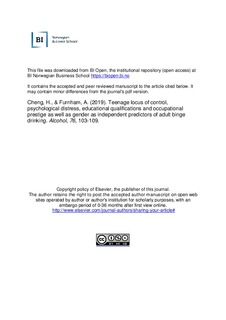Teenage locus of control, psychological distress, educational qualifications and occupational prestige as well as gender as independent predictors of adult binge drinking
Peer reviewed, Journal article
Accepted version
Permanent lenke
http://hdl.handle.net/11250/2633686Utgivelsesdato
2019Metadata
Vis full innførselSamlinger
- Publikasjoner fra CRIStin - BI [1015]
- Scientific articles [2181]
Sammendrag
Our objective was to investigate various psychological and socio-demographic factors in childhood and adulthood that relate to alcohol intake and binge drinking at age 42 years.
Data were drawn from the 1970 British Cohort Study (BCS70), a prospective longitudinal study monitoring the development of babies born in 1970, with nine follow-ups. The analytic sample comprised 5190 cohort members with complete data on parental social class at birth, cognitive ability at age 10 years, locus of control at age 16 years, psychological distress at age 30 years, educational qualifications obtained at age 34 years, and current occupation and alcohol consumption at age 42 years. Results showed that sex (male), lower parental social class, adolescent external locus of control, psychological distress, lower scores on childhood intelligence, lower educational qualifications, and less-professional occupations were all significantly and positively associated with binge drinking in adulthood. Hierarchical logistic regression analyses showed that sex (OR = 0.52, CI: 0.44–0.60, p < .001), parental social class (OR = 0.67, CI: 0.50–0.92 to OR = 0.49, CI: 0.31–0.57, p < .05 to p < .01), locus of control beliefs (OR = 0.90, CI: 0.84–0.96, p < .01), adult psychological distress (OR = 1.28, CI: 1.04–1.58, p < .05), educational qualifications (OR = 0.70, CI: 0.53–0.92 to OR = 0.39, CI: 0.25–0.61, p < .05 to p < .001), and occupational prestige (OR = 0.59, CI: 0.38–0.95 to OR = 0.36, CI: 0.20–0.65, p < .05 to p < .01) were all significant and independent predictors of adult binge drinking. Both psychological and socio-demographic factors associated with adult excessive alcohol consumption. Adolescent locus of control beliefs had a significant effect on adult binge drinking 26 years later.
